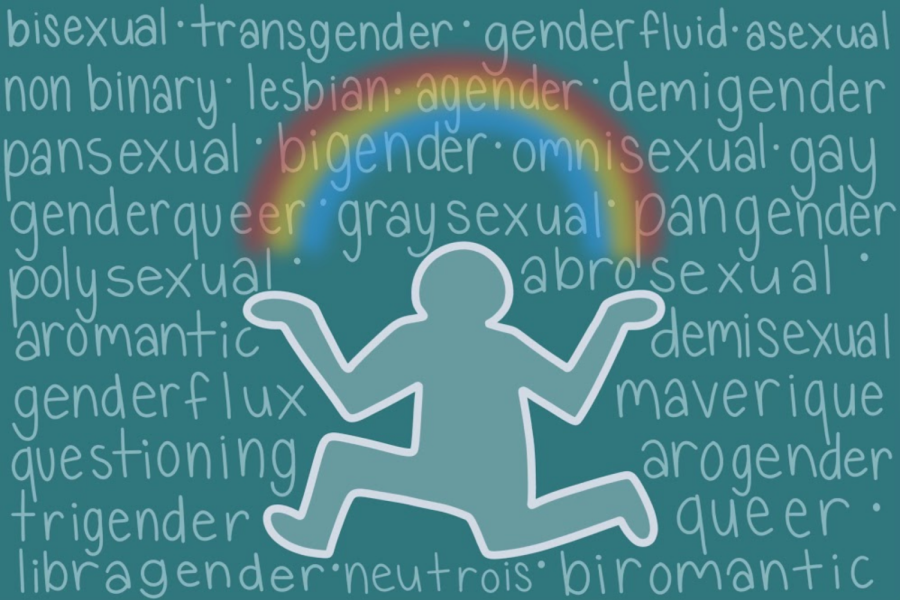Tired eyes absorb the blue light of my phone as my mind becomes jumbled, crafting a mental Venn diagram of labels. Overlapping, colliding, adding, erasing. This Venn diagram symbolized a world of possibilities to me, and there was practically a label for any sexuality or gender. But how practical would these labels actually be?
Despite more significant advancements in LGBTQ rights, there are still countless more minor issues hindering efforts to create safer communities. Namely, the pressure to fall under a label that society deems well-known and “convenient.” With hundreds of sexuality and gender labels overlapping and colliding, it isn’t always easy to “pick” the right one. However, lately, the LGBTQ community has seen an increasing pressure to conform to societal standards, to make our existence easier for others to understand. This expectation is unrealistic and creates even larger pressure in an already confusing process, influencing LGBTQ people to label themselves in an easily-understood way when there shouldn’t be pressure to identify with any label in the first place.
Although most people are familiar with umbrella terms like queer or transgender, there are hundreds more terms to accurately describe a person’s sexuality or gender. And in the end, some people simply do not wish to label themselves. While labels are essential to some people, they also create “boxes” that others try to fit the LGBTQ community into. Identity is constantly evolving, and one — often inaccurate — dictionary definition can’t describe subjects as complex as sexuality and gender. Unfortunately, even with an immeasurable amount of resources available to learn about these identities, a vast majority of the population still lacks education, whether it be about stereotypes, identity or proper terminology.
Even numerous people who deem themselves “accepting” of the LGBTQ community seem to be uninformed about the basics of standard terms. Too often, LGBTQ people find themselves adjusting their identities and pronouns to conform to standards and unspoken rules predetermined by society: “Only use labels that are easy to comprehend. Take it upon yourself to educate anyone who doesn’t understand your identity. Change your identity to make my life easier.”
Due to the absence of proper education on LGBTQ issues in health classes and a lack of representation in core learning spaces, health curriculums tend to showcase familiar labels exclusively. Health classes are set up to educate all students, but fail to represent the LGBTQ community. A recent Florida bill commonly referred to as the “Don’t Say Gay” bill by various media sources aims to restrict LGBTQ curriculum that’s deemed “not age-appropriate.” This bill contains vague language, making it harder to determine the line between legal and illegal teachings. It also removes a school’s right to teach about any label or identity — let alone less-known labels or those who choose no label. This begs the question, how is further progress supposed to be made when lawmakers actively take away fundamental rights?
Discrimination against LGBTQ youth often has detrimental effects, and a large portion of discrimination is attributed to disrespecting pronouns and identity. In a 2020 Trevor Project national survey, only 20% of nonbinary and transgender youth reported having their pronouns respected by most people in their lives. The same study found that 28% of transgender and nonbinary youth who reported that no people respect their pronouns have attempted suicide. This is compared to 12% of transgender and nonbinary youth who reported that most people respect their pronouns.
Society frequently disregards these actions, noticing the issue yet watching as bystanders with little urge to become more accepting. To achieve a genuinely accepting society, we must let go of the notion that identity is only acceptable if it’s considered easy to understand. We are living in a society where people are much more willing to push LGBTQ youth to suicide rather than respecting their pronouns and identity.
Rather than ostracizing people into categories of “right” and “wrong,” we must have the decency to provide others with respect. This is an issue that transcends various beliefs and viewpoints. Whether a person is cisgender, heterosexual or LGBTQ, identity is a core part of being human. It’s time we make an effort to understand one another instead of waiting for a more convenient option to come along.



![Sitting courtside before a junior varsity girls’ tennis match, senior Tanisi Saha rushes to finish her homework. Saha has found herself doing academic work during her athletic activities since her freshman year. “Being in sports has taught me how to stay organized and on top of my schoolwork. [With] a busy practice and game schedule, I’ve learned to manage my homework and study time better,” Saha said.](https://pwestpathfinder.com/wp-content/uploads/2025/11/DSC_0022-1200x800.jpg)
![Sophomore Maryem Hidic signs up for an academic lab through Infinite Campus, a grading and scheduling software. Some students enjoyed selecting their responsive schedule in a method that was used school-wide last year. “I think it's more inconvenient now, because I can't change [my classes] the day of, if I have a big test coming and I forget about it, I can't change [my class],” sophomore Alisha Singh said.](https://pwestpathfinder.com/wp-content/uploads/2025/10/DSC_0012-1200x801.jpg)
![Senior Dhiya Prasanna examines a bottle of Tylenol. Prasanna has observed data in science labs and in real life. “[I] advise the public not to just look or search for information that supports your argument, but search for information that doesn't support it,” Prasanna said.](https://pwestpathfinder.com/wp-content/uploads/2025/10/DSC_0073-2-1200x800.jpg)
![Junior Fiona Dye lifts weights in Strength and Conditioning. Now that the Trump administration has instituted policies such as AI deregulation, tariffs and university funding freezes, women may have to work twice as hard to get half as far. "[Trump] wants America to be more divided; he wants to inspire hatred in people,” feminist club member and junior Clara Lazarini said.](https://pwestpathfinder.com/wp-content/uploads/2025/05/Flag.png)
![As the Trump administration cracks down on immigration, it scapegoats many immigrants for the United States’ plights, precipitating a possible genocide. Sophomore Annabella Whiteley moved from the United Kingdom when she was eight. “It’s pretty scary because I’m on a visa. When my visa expires next year, I’m not sure what’s going to happen, especially with [immigration] policies up in the air, so it is a concern for my family,” Whiteley said.](https://pwestpathfinder.com/wp-content/uploads/2025/05/DSC_0077-7copy.jpg)
![Shifting global trade, President Donald Trump’s tariffs are raising concerns about economic stability for the U.S. and other countries alike. “[The tariffs are] going to pose a distinct challenge to the U.S. economy and a challenge to the global economy on the whole because it's going to greatly upset who trades with who and where resources and products are going to come from,” social studies teacher Melvin Trotier said.](https://pwestpathfinder.com/wp-content/uploads/2025/05/MDB_3456-1200x800.jpg)



![Some of the most deadly instances of gun violence have occurred in schools, communities and other ‘safe spaces’ for students. These uncontrolled settings give way to the need for gun regulation, including background and mental health checks. “Gun control comes about with more laws, but there are a lot of guns out there that people could obtain illegally. What is a solution that would get the illegal guns off the street? We have yet to find [one],” social studies teacher Nancy Sachtlaben said.](https://pwestpathfinder.com/wp-content/uploads/2025/01/DSC_5122-1200x800.jpg)

![Sophomore Shree Sikkal Kumar serves the ball across the court in a match against Lindbergh. Sikkal Kumar has been a varsity member of the varsity girls’ tennis team for two years, helping her earn the number two rank in Class 2 District 2.“When matches are close, it’s easy to get nervous, but I [ground] myself by[staying] confident and ready to play,” Sikkal Kumar said.](https://pwestpathfinder.com/wp-content/uploads/2025/11/DSC2801-1200x798.jpg)
![Dressed up as the varsity girls’ tennis coach Katelyn Arenos, senior Kate Johnson and junior Mireya David hand out candy at West High’s annual trunk or treat event. This year, the trunk or treat was moved inside as a result of adverse weather. “As a senior, I care less about Halloween now. Teachers will bring their kids and families [to West’s Trunk or Treat], but there were fewer [this year] because they just thought it was canceled [due to the] rain. [With] Halloween, I think you care less the older you get,” Johnson said.](https://pwestpathfinder.com/wp-content/uploads/2025/10/DSC00892-1-1200x800.jpg)
![Focused on providing exceptional service, sophomore Darsh Mahapatra carefully cleans the door of a customer’s car. Mahapatra has always believed his customers deserve nothing less than the best. “[If] they’re trusting us with their car and our service, then I am convinced that they deserve our 100 percent effort and beyond,” Mahapatra said.](https://pwestpathfinder.com/wp-content/uploads/2025/10/DSC_0018-1200x800.jpg)
![Sophomore Aleix Pi de Cabanyes Navarro (left) finishes up a soccer game while junior Ava Muench (right) warms up for cross country practice. The two came to Parkway West High School as exchange students for the 2025-2026 school year. “The goal for the [exchange] program is to provide opportunities for both Parkway students and our international exchange students to learn about other cultures, build connections and become confident, capable, curious and caring — Parkway’s Four C’s — in the process,” Exchange Program Lead Lauren Farrelly said.](https://pwestpathfinder.com/wp-content/uploads/2025/10/Feature-Photo-1200x800.png)
![Leaning on the podium, superintendent Melissa Schneider speaks to Parkway journalism students during a press conference. Schneider joined Parkway in July after working in the Thompson School District in Colorado. “My plan [to bond with students] is to get things on my calendar as much as possible. For example, being in [classes] is very special to me. I am trying to be opportunistic [meeting] kids [and] being in [the school] buildings. I have all the sports schedules and the fine arts schedules on my calendar, so that when I'm available, I can get to them,” Schneider said.](https://pwestpathfinder.com/wp-content/uploads/2025/09/IMG_5425-1200x943.jpeg)
![Gazing across the stage, sophomore Alexis Monteleone performs in the school theater. The Monteleone family’s band “Monte and the Machine” has been releasing music since 2012, but Alexis started her own solo career in 2024 with the release of her first single, Crying Skies. “My whole family is very musical, [and I especially] love writing [songs with them],” Monteleone said.](https://pwestpathfinder.com/wp-content/uploads/2025/09/DSC7463-1200x798.jpg)

![Leaping through the air, senior Tyler Watts celebrates his first goal of the season, which put the Longhorns up 1-0 against the Lafayette Lancers. Watts decided to play soccer for West for his last year of high school and secured a spot on the varsity roster. “[Playing soccer for West] is something I had always dreamed of, but hadn’t really had a good opportunity to do until now. It’s [really] fun being out [on the field], and I’m glad I decided to join the team. It’s just all about having fun with the boys and enjoying what time we have left together,” Watts said.](https://pwestpathfinder.com/wp-content/uploads/2025/09/DSC_1951-1200x855.jpg)


Dr. Piffel • May 23, 2022 at 8:13 am
Thank you for writing this article, Addie! It provides an opportunity for others to learn another perspective and see from a different lens.
Emily • May 17, 2022 at 10:40 am
So well written. Great article, Addie.
Serena Liu • May 17, 2022 at 8:41 am
great story Addie!